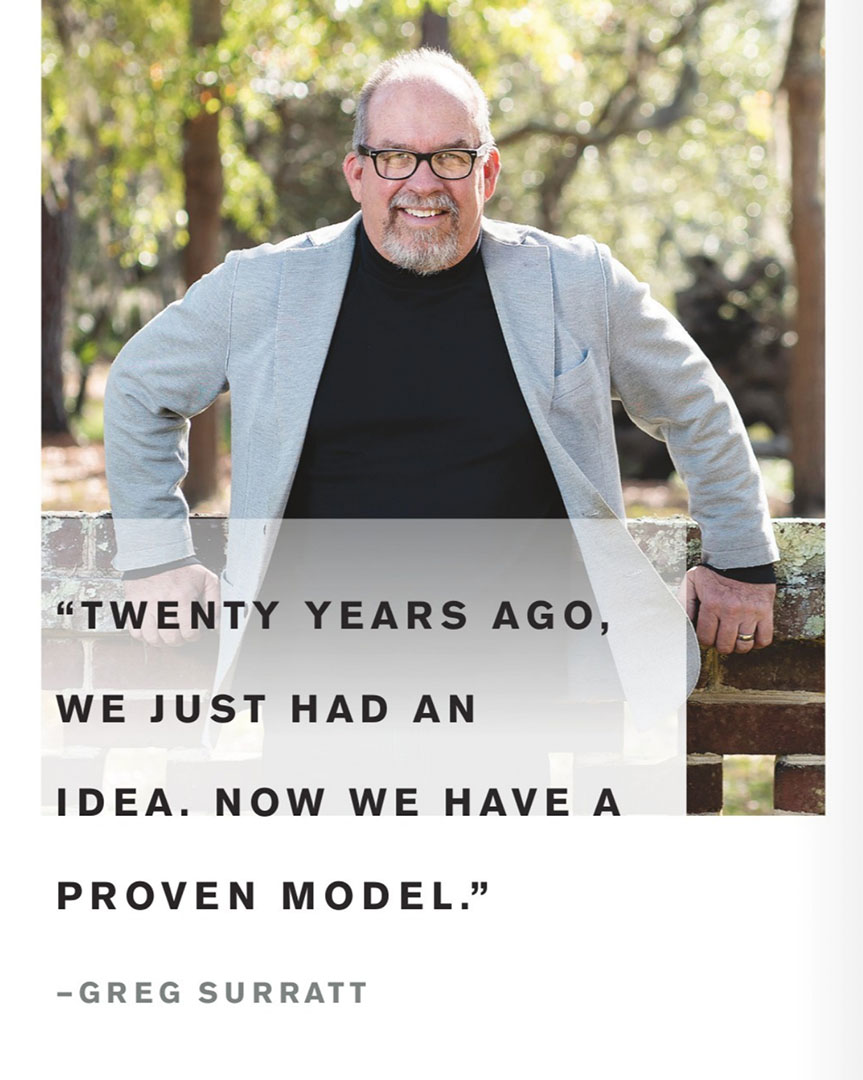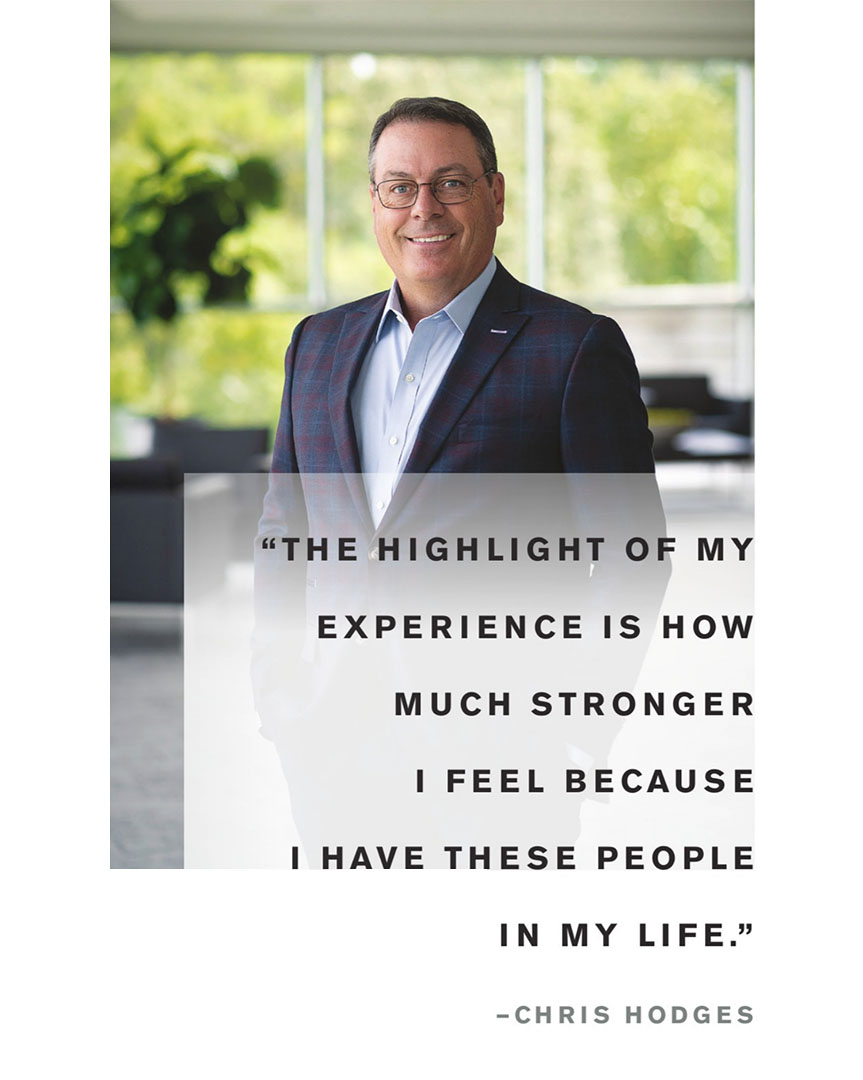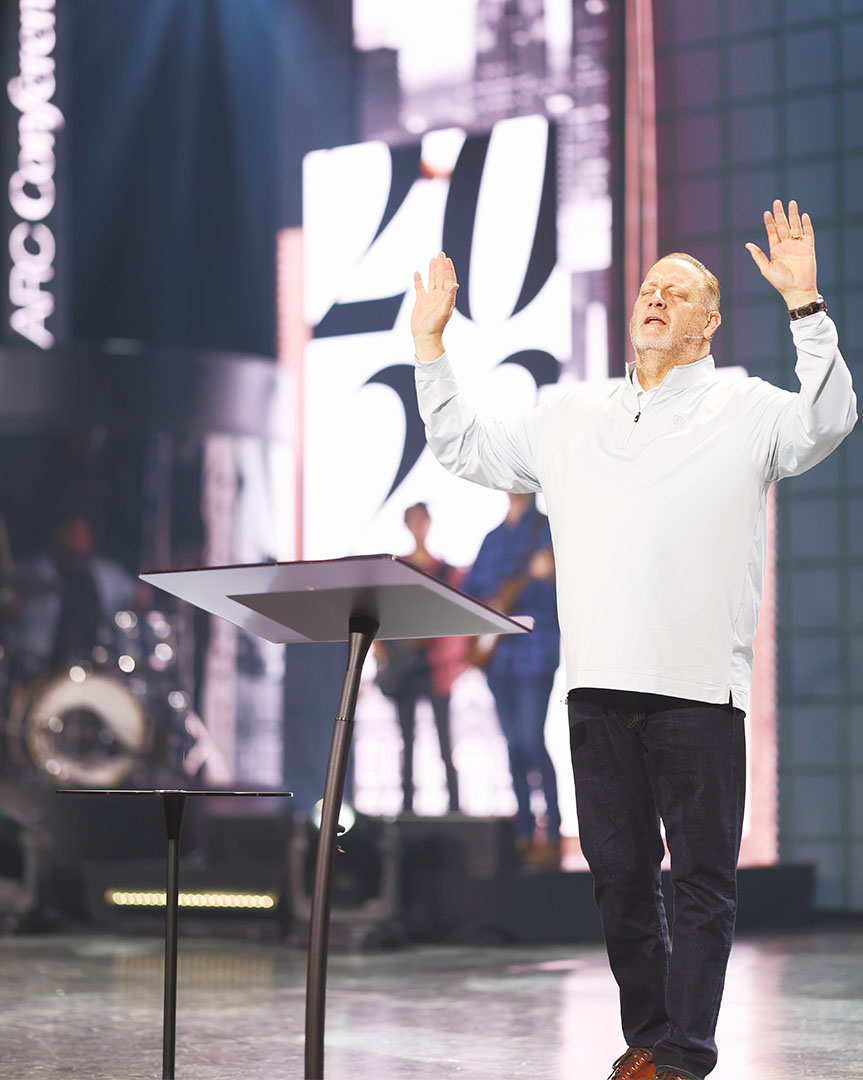
How ARC is building on its winning formula for multiplying healthy churches.
RICK BEZET WAS BETWEEN planes at the Dallas-Fort Worth International Airport in late January when his phone buzzed with a text notification from someone named Paul Morrison. Though Bezet didn’t remember meeting him, the Dallas-area pastor had launched a church in September of 2021.

“He was thanking me for this vision God had given him,” says Bezet, pastor of New Life Church in Conway, Arkansas, and part of the group that founded Association of Related Churches (ARC), the church planter training-and-resourcing initiative that had helped Paul Morrison launch his church. “I’m looking at all the pictures of people being baptized and learning exactly where they are in their walk with Him.”
The reason Morrison recalls his first encounter with Bezet so well: At an ARC roundtable in January of 2021, the Arkansas pastor offered seed money to Morrison before he had finalized plans. With ARC’s training and financial help, Cadence Church in Frisco (just north of Dallas) opened in September of 2021. It now averages nearly 200 on a Sunday.
“They gave us a game plan, told us how to do it and walked us through everything,” Morrison says. “I don’t think I would have known how to do it without them.” Such fervent reactions are common, Bezet says. People interested in starting churches regularly contact him and other ARC leaders with questions about the training that is a hallmark of the association’s church-planting emphasis. And, later calling back to thank them for their help. “I think we’re making a difference because we’re giving people good ideas,” Bezet comments. “It’s no longer giving people good ideas from the original church plant. It’s about what happened last weekend. They’re sharing what worked and didn’t work.”
“I’m just amazed,” says ARC president Greg Surratt, whose original vision to start 2,000 churches surpassed the midway point last year. “I think about it every once in a while. Even though that number is something I said years ago, it’s still amazing to watch it happen.” Indeed, the number of ARC-launched churches is nearing 1,100 as member of this church-planting powerhouse prepare to gather in Birmingham, Alabama, April 25-26 for their latest annual conference.


It may be hard to envision a crowd of 4,000 feeling like they’re at a family reunion. But those who helped start the association say the closeness of their relationships since 2001 represents the crowning joy of the past two decades. “We’ve all become wonderful friends,” says Chris Hodges, pastor of Church of the Highlands, which will host the upcoming meeting. “That’s one of the unexpected outcomes. We deeply love each other.
“We do things missionally, but we also do things relationally. Many of us have become close friends. Our spouses and children know each other. My kids’ best friends in the ministry are all in ARC churches. The highlight of my experience is how much stronger I feel because I have these people in my life.”
HUMBLE ROOTS
With ARC groups in all corners of the world, it’s easy to forget the organization’s humble roots, which began with staffers from Surratt’s Seacoast Church in Charleston, South Carolina, visiting Bethany Church in Baton Rouge, pastored by Larry Stockstill. They went to Louisiana to learn more about cell church networks from Bethany staff member Billy Hornsby (father-in-law of Chris Hodges).
Hornsby eventually came to Charleston to lead cell training; later, during a golf game Hornsby asked the South Carolina pastor about his compelling dream. Surratt shared his desire to start 2,000 churches. When Hornsby asked how that was going, Surratt admitted not too well—the first three had all failed, including their latest expensive venture on the West Coast. “You have a good model,” replied Hornsby, who would go on to become ARC’s key leader. “You just don’t know how to build organizations.”
That meeting led to others, and to Surratt’s introduction to Hodges and Bezet, who were planning to leave Bethany to plant churches. One day Surratt made an off er to Hodges (and later to Bezet): Seacoast would guarantee a first-year budget of $150,000. Not an outright grant, but whenever they fell short of collecting $12,500 during a month, Seacoast would make up the difference. Bezet recalls being so floored by the offer that he tracked Surratt down later to verify exactly what that meant.
The Seacoast pastor explained: For the first year you’re guaranteed $12,500 a month. If you only take in $7,500, we’ll send the other $5,000. New Life Church’s first-month offerings totaled $17,623 (Bezet knows because he’s been telling the story for 22 years) and never required any outside funding.

“I called Greg and said we didn’t need his money because we took more than ($12,500) in,” Bezet says. “He said, ‘Great. Do you know anyone else I can give your money to?’ You can imagine the craving inside of me to say, ‘You know, one day when we can do that, we’re going to do that.’”
“That first year is the critical year,” says Hodges, whose church now spans 20 campuses and 43,000 in weekly attendance. “We were just so thrilled to have that offer. I said, ‘What do you want in return?’ Greg said, ‘If it works, let’s seed that and reinvest it in new church plants.’”
This is how ARC’s funding model came into being. Churches that launch with ARC’s funding are asked to reinvest, over time, that same amount back into ARC church planting for the next church planter. ARC churches are already encouraged to be missional by giving 10% of their church income to missions. So, the “pay it forward” approach has allowed ARC to keep reusing the money for church planting over and over. Once the new church has reinvested that money, they’re asked to consider continuing to give 2% of their church income to ARC church planting going forward which allows for further church planting expansion.
SHOESTRING START
In addition to Surratt, Hodges, Bezet and Hornsby, Billy’s brother Scott and Dino Rizzo (now ARC’s executive director) were part of the brainstorming session that led to the official launch in 2000. It was a shoestring effort initially, since everyone involved was busy pastoring a church.

“In the beginning we didn’t know it was the beginning,” Hodges says with a chuckle. “When Rick and I were going out there was no churchplanting money, materials or training. “Rick and I had huge launches, and that first month [Highlands] needed a little, but after that we were OK. We picked another person and gave money to them, and that’s when it dawned on us: Why don’t we do this for a lot of people?”
Naturally, success bred success. When others saw what Church of the Highlands and New Life Church were doing, they wanted to know more. The pair fielded so many inquiries, Hodges said they decided to gather 30 people in one room instead of trying to process 30 calls individually.
That’s how ARC training began. With those early sessions came this request: Would you take the money we invest in you and invest it into the next generation of church planters? “Lo and behold, it turned into an organization that I think is one of the best—if not the best—church-planting organizations in America that accepts, trains, launches and then helps them that first year,” Hodges says. “God enabled us by giving us that idea. We wanted to do for someone else what was done for us.” Today an administrative staff of 40, based at the Billy Hornsby Center for Church Planting (named for the leader who died of cancer in 2011) in Birmingham, help train and equip those who are starting churches across the world.
The association hosts major conferences and multiple events annually, including:
- ARC Conferences. Designed for pastors, ministry leaders and teams, they help build relationships and equip attendees with tools and resources. While this year’s is returning to Birmingham, it has met in such locales as Dallas, Jacksonville, Anaheim and Charleston. Other places, like Canada, Ireland and South Africa have their own national conferences.
- Gather. These regional one-day events for pastors and leaders place an emphasis on building relationships.
- Meetups. Held year-round, these regional pastoral events can range from monthly coffees to lunches or prayer meetings.
- ARC Launch. This is the first step of planting a church with ARC. The event is held multiple times during the year, with planters receiving information on the nuts and bolts of church planting and given an opportunity to decide if they want to apply.
Although many leaders came from charismatic backgrounds, ARC has resisted traditional categories, saying many in the unchurched world don’t understand them. Instead, it places an emphasis on planting “life-giving” churches, meaning a focus on prayer, services fi lled with God’s presence and presentation of a clear gospel message that can be understood by non-believers.
“The simplest explanation I can give you is if you’ve ever been to a non-life-giving church, you know what a life-giving church is,” says Surratt. “To me, it’s about a church being more interested in what they can do for you than what they can get from you. It’s just a different mindset.”
LARGE LAUNCHES
One of the group’s aims is helping churches launch large, as evidenced by five congregations that started the same Sunday in late January in Goodyear, Arizona; Tacoma, Washington; Lawrenceville, Georgia; Lexington, Kentucky; and Los Angeles. The five averaged nearly 500 per church.
While the age range of most ARC church planters is 30s and early 40s, some have been as young as 26 or in their late 40s and early 50s. It’s all about heart and passion, says Rizzo, adding that ARC doesn’t want planters to lack the life experience needed to minister to parents, blended families and single parents. No matter the planter’s age, one of the most remarkable statistics for those who have started with ARC’s help the past 22 years is that after five years, 90% of those churches are still around. Rizzo, who moved to Birmingham 10 years ago, says to be able to be part of Christ’s commandment to build His church is something for which he is most thankful. To get to do something that makes an eternal difference and to do it with people you love is another blessing, he says.
In addition, Rizzo has been around long enough to see the fruit of churches opening multiple campuses or starting new Dream Center community outreach programs, giving to international missions and helping people in pain—be that prison inmates, the homeless or those needing food and clothing. Even though now serving as Executive Director, Rizzo says he still “bleeds” church planting and outreach, since an outreach brought him to Christ. Besides, he says, the day-to-day duties may be different, but it’s not a lot different than leading a church.
“It’s small groups, it’s people, trying to get the vision done,” Rizzo says. “You’re there and caring for people and championing the vision and their stories. Those are things I wake up in the morning thinking about. “I’m still a church planter, but I’m doing it through somebody else. I’m doing launch training or helping people fi ll out applications or answering a boatload of questions about church planting and working with partners that give us finances … I feel like when I launched a church back in 1992.”

Rizzo says most of the churches ARC has planted are healthy and making a difference in their communities. One that started in Atlanta last fall grew so quickly it had to move three times in its first six months. Others have had serious adjustments, like the couple who launched in an economically depressed area. When they arrived for their first service, crime scene tape was stretched across the parking lot because of a shooting the previous night. Another couple the association helped faced crisis when the night before their launch someone stole the trailer where they stored their equipment.
A few years ago five ARC churches launched one frigid Sunday in New England, with three greeted by busted water pipes at the facilities where they met. That meant putting wet-dry vacuums into action, getting squeegees to dry up the water or meeting in the hallway. “When there’s scarcity, things like that happen,” Rizzo says. “You get real creative in a minute.”
POSITIVE IMPACT
The leaders of other ministries whose work has been positively impacted by this mission speak highly of the association. Rob Hoskins, president of Florida-based One Hope, says through the years ARC churches’ children and youth ministries have collaborated with them to build some of the Bible-extending ministry’s most effective programs, such as Bible App for Kids and Kid’s Bible Experience.
Part of ARC’s vision, values and strategy is investing in missions, which has provided millions of dollars for the kingdom. Not only has OneHope been a major recipient of that generosity, Hoskins says this partnership has provided effective evangelism and discipleship programs for thousands of churches and millions of children.
In addition, an ever-changing world calls for innovation, and ARC has found sustainable ways to branch out from traditional boundaries, Hoskins says: “The success ARC has had in serving the church on a global level should be inspiring to all believers, and it’s a testament to how the Holy Spirit is working through them to unite the body of Christ and reach the unreached in every nation.”
David Meyer, CEO of humanitarian organization Hand of Hope (HoH), says the tight-knit bonds within ARC churches are invaluable in times of natural disasters. If something horrible happens almost anywhere in the USA, he says there will almost always be an ARC church close by helping those whose lives have been turned upside down. That also gives HoH trusted relationships “on the ground” to work with.
Many ARC churches have helped in other relief projects around the world. Because from the beginning one of ARC’s core values bas been servanthood to those in need, these churches make Jesus look good to a lost world in pain, Meyer adds. “Obviously, we all believe the church is one of the most important entities in fulfilling the Great Commission,” Meyer says. “And ARC has been one of the most innovative and cutting-edge church-planting movements I know of in the USA.”
For now, Surratt says ARC plans to continue on the path toward the next 1,000 churches. At the same time, it has to “crystallize” its methods and recognize that planting churches in urban areas is much different than rural areas. “Twenty years ago, we just had an idea,” Surratt says. “Now we have a proven model and ministers who have already done it. I think some of the secret sauce with ARC is the coaching. Twenty years ago we had Billy Hornsby, and he loved pastors and tried to help them as much as he could. “Today we have a full training system, with coaches who have planted their churches in the last three to five years. So they’re constantly updating what they’re seeing in the process. It’s kind of like a learning organization. We’re constantly trying to learn what’s the max—what’s best. How can we do that?”
Asking such questions has led to efficient answers. That is demonstrated by the hundreds of new churches that didn’t exist in 2001.
—
This article was featured in the Spring 2023 AVAIL Journal.
A freelance writer and book editor from Huntington, West Virginia, who has profiled numerous spiritual leaders and businesspersons during his career. He has more than 4,500 article bylines and has co-authored, edited or contributed to more than 90 books.


